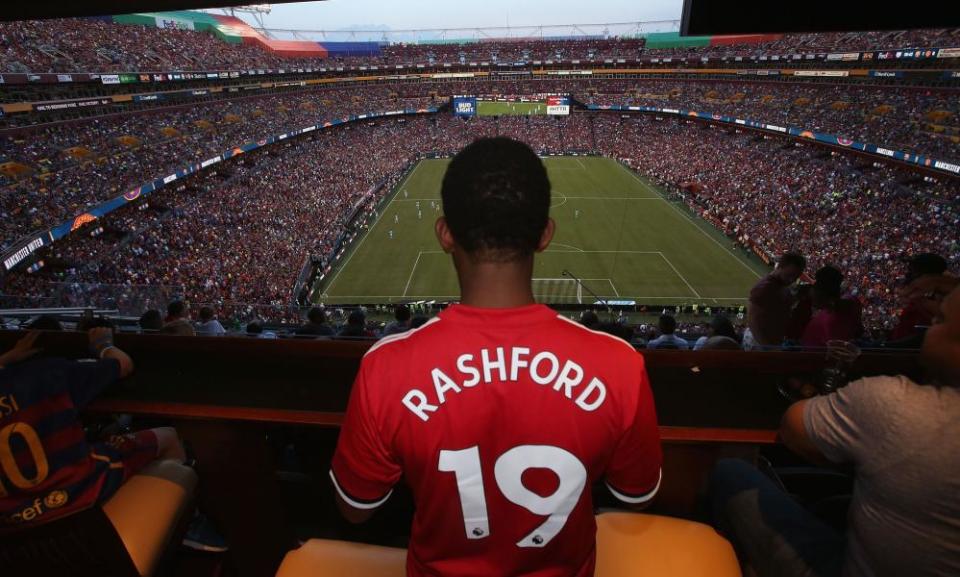'It used to be about Man United-ness': how ICC changed the pre-season friendly

Charlie Stillitano knows exactly when everything fell into place. “I sat down with José Mourinho in 2003 and he said. ‘I want to play really hard games,’” the New Yorker, who appears to be friends with every football A-lister, tells the Guardian. “José was the first person to not just embrace it, but demand it. Sir Alex Ferguson later wrote he learned something from José about getting ready to start the season. It was like total stamp-endorsing.”
Memories of this summer’s World Cup remain fresh in the minds of fans, yet the modern football juggernaut waits for no one. This week sees the good and the great from Europe — Manchester United, Manchester City, Barcelona, Bayern Munich, Juventus, Real Madrid, Liverpool and both Milan clubs among others — begin their pre-season preparations in earnest as the International Champions Cup (ICC) rolls around once again. A sauntering summer kick-about this is not – the tournament involves 18 teams, 27 matches, three continents, and 22 cities in eight countries.
Stillitano, executive chairman of Relevent Sports, the company behind the ICC, says this year’s incarnation is more inclusive than ever before. For the first time, a four-team women’s tournament is on the schedule, alongside a new under-14 futures competition, which is being trumpeted as football’s version of the Little League World Series.
Stillitano believes the quality of teams in the ICC means the days of the bigs guns from the Premier League, La Liga, Bundesliga, and Serie A reluctantly hopping on a plane, kicking a ball around, and smiling through gritted teeth at the opening of a new gas station, are gone.
“I went with Manchester United to Singapore in 2001, just to get a feel for things as we were bringing them over in future years,” he says. “They played a Singapore XI. Fabien Barthez played striker, and it was all the Manchester United fans laughing and joking, even the board members.
“It was more like the celebration of Man Unitedness. And, then I remember in 2002 was the first game we ever did. Real Madrid versus Roma. Fabio Capello was the manager of Roma and everyone thought we were going to do terribly. They said a club match wouldn’t sell, but Giants Stadium sold out.
“An English-American journalist stood up and said, ‘I don’t understand what the big deal is here. It’s just a friendly.’ Capello was having none of it. ‘Do you see who is here? Zidane, Figo, Totti, Roberto Carlos, Cafu, Panucci. You think they want to lose to each other tomorrow?’
“That stuck with me. If you can get them out in the field together, they’ll fight. Of course, it’s still pre-season. Players won’t be going all-out for 90 minutes.”
Purely from a North American viewpoint, the ICC helps football’s profile in the summer – particularly when the likes of the NFL and NBA are in their off-season and fans look to other forms of entertainment. Last summer saw three of the most attended football matches in US history - 93,098 for Real versus Manchester City in Los Angeles, 82,104 for Barcelona’s clash with Juventus in New Jersey, and 80,162 for Barca and Manchester United. The crowds will flock once again this year – Manchester United’s meeting with Liverpool at Michigan’s 107,000-capacity Big House could break records – and the ripple effect is clear.
Relevent have recently purchased football marketer BRC Group, allowing them to take control of FC Alianza, the largest and most prestigious amateur Hispanic football program in the US. The Futures tournament, meanwhile, includes eight state and eight MLS development teams, as well as Arsenal, Liverpool, Tottenham, Atlético Madrid, Borussia Dortmund, Chelsea, Celtic and Bayern Munich.
“The future of the sport depends on finding, training, and encouraging emerging players,” says Stillitano.
However, the ICC’s two-week spell cuts right across MLS and eats into fans’ attention – as well as the revenue streams. The market isn’t that big, after all. So, is there any friction? “We have an open dialogue and a good partnership with MLS,” says the Relevent Sports CEO, Daniel Sillman.
Events in Russia mean many top players will be taking a breather, while their teammates return to work, but matches like Real Madrid v Manchester United in Miami on 31 July have been placed near the end of the schedule to ensure some stardust will be sprinkled at Hard Rock Stadium.
“We know it’s not the Premier League, La Liga, or the Champions League,” says Stillitano. “We’re not trying to pretend differently, but it’s a serious tournament all the big teams want to be in to prepare the proper way.”
On a more personal level, Stillitano says the tournament has helped shift his own perceptions.
“I’m an AC Milan fan, so when I was dealing with someone like Marco Materazzi at Inter, I would always think what a knucklehead this guy is,” he says with a smile. “But you meet him and he’s the sweetest guy in the world.
“He would take a tray from the Four Seasons hotel in Philadelphia every day filled with food and take it out to the homeless people on his own. No one told him to do it. You see that and I can’t hate these guys anymore. It’s all about making everyone happy - and I think we’re doing just that.”

 Yahoo Sport
Yahoo Sport 





































